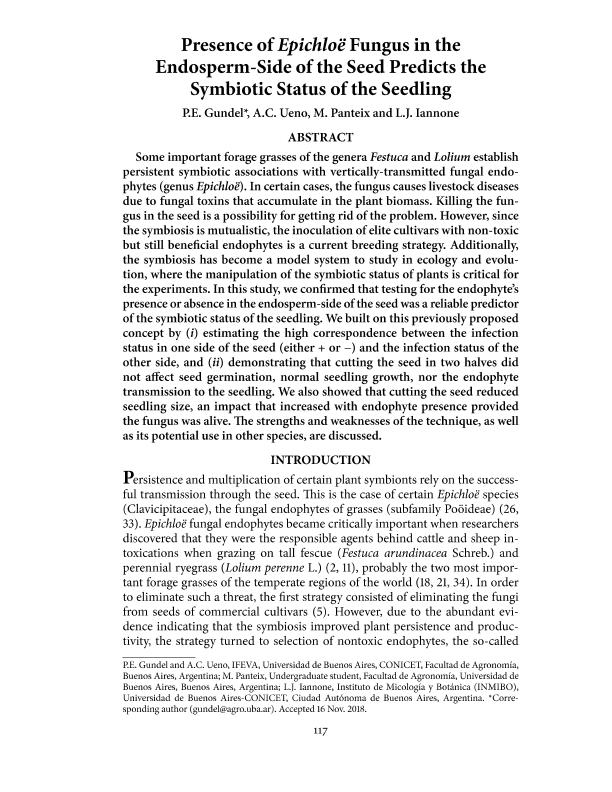Mostrar el registro sencillo del ítem
dc.contributor.author
Gundel, Pedro Emilio

dc.contributor.author
Ueno, Andrea Celeste

dc.contributor.author
Panteix, M.
dc.contributor.author
Iannone, Leopoldo Javier

dc.date.available
2020-01-29T19:54:20Z
dc.date.issued
2018-06
dc.identifier.citation
Gundel, Pedro Emilio; Ueno, Andrea Celeste; Panteix, M. ; Iannone, Leopoldo Javier; Presence of Epichloë Fungus in the Endosperm-Side of the Seed Predicts the Symbiotic Status of the Seedling; Seed Technology; Seed Technology; 39; 2; 6-2018; 117-127
dc.identifier.issn
1096-0724
dc.identifier.uri
http://hdl.handle.net/11336/96149
dc.description.abstract
Some important forage grasses of the genera Festuca and Lolium establish persistent symbiotic associations with vertically-transmitted fungal endophytes (genus Epichloë). In certain cases, the fungus causes livestock diseases due to fungal toxins that accumulate in the plant biomass. Killing the fungus in the seed is a possibility for getting rid of the problem. However, since the symbiosis is mutualistic, the inoculation of elite cultivars with non-toxic but still benefcial endophytes is a current breeding strategy. Additionally, the symbiosis has become a model system to study in ecology and evolution, where the manipulation of the symbiotic status of plants is critical for the experiments. In this study, we confrmed that testing for the endophyte?s presence or absence in the endosperm-side of the seed was a reliable predictor of the symbiotic status of the seedling. We built on this previously proposed concept by (i) estimating the high correspondence between the infection status in one side of the seed (either + or −) and the infection status of the other side, and (ii) demonstrating that cutting the seed in two halves did not afect seed germination, normal seedling growth, nor the endophyte transmission to the seedling. We also showed that cutting the seed reduced seedling size, an impact that increased with endophyte presence provided the fungus was alive. Te strengths and weaknesses of the technique, as well as its potential use in other species, are discussed.
dc.format
application/pdf
dc.language.iso
eng
dc.publisher
Seed Technology
dc.rights
info:eu-repo/semantics/openAccess
dc.rights.uri
https://creativecommons.org/licenses/by-nc-sa/2.5/ar/
dc.subject
Endophyte-plant symbiosis
dc.subject
seed ecophysiology
dc.subject
endophyte fungi
dc.subject.classification
Agronomía, reproducción y protección de plantas

dc.subject.classification
Agricultura, Silvicultura y Pesca

dc.subject.classification
CIENCIAS AGRÍCOLAS

dc.title
Presence of Epichloë Fungus in the Endosperm-Side of the Seed Predicts the Symbiotic Status of the Seedling
dc.type
info:eu-repo/semantics/article
dc.type
info:ar-repo/semantics/artículo
dc.type
info:eu-repo/semantics/publishedVersion
dc.date.updated
2019-10-23T21:16:36Z
dc.journal.volume
39
dc.journal.number
2
dc.journal.pagination
117-127
dc.journal.pais
Estados Unidos

dc.description.fil
Fil: Gundel, Pedro Emilio. Consejo Nacional de Investigaciones Científicas y Técnicas. Oficina de Coordinación Administrativa Parque Centenario. Instituto de Investigaciones Fisiológicas y Ecológicas Vinculadas a la Agricultura. Universidad de Buenos Aires. Facultad de Agronomía. Instituto de Investigaciones Fisiológicas y Ecológicas Vinculadas a la Agricultura; Argentina
dc.description.fil
Fil: Ueno, Andrea Celeste. Consejo Nacional de Investigaciones Científicas y Técnicas. Oficina de Coordinación Administrativa Parque Centenario. Instituto de Investigaciones Fisiológicas y Ecológicas Vinculadas a la Agricultura. Universidad de Buenos Aires. Facultad de Agronomía. Instituto de Investigaciones Fisiológicas y Ecológicas Vinculadas a la Agricultura; Argentina
dc.description.fil
Fil: Panteix, M.. Universidad de Buenos Aires. Facultad de Agronomía; Argentina
dc.description.fil
Fil: Iannone, Leopoldo Javier. Consejo Nacional de Investigaciones Científicas y Técnicas. Oficina de Coordinación Administrativa Ciudad Universitaria. Instituto de Micología y Botánica. Universidad de Buenos Aires. Facultad de Ciencias Exactas y Naturales. Instituto de Micología y Botánica; Argentina
dc.journal.title
Seed Technology
dc.relation.alternativeid
info:eu-repo/semantics/altIdentifier/url/https://stjournal.org/volume-39-no-2-2018/
Archivos asociados
